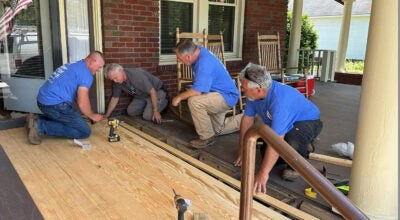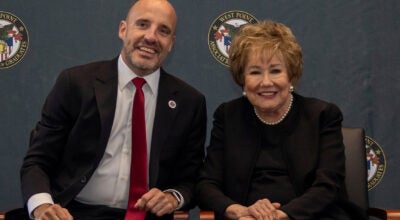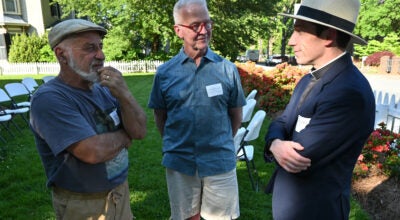Finding treasure in a Gypsy camp: First Baptist visits church in Monkacs, Ukraine
Published 12:00 am Tuesday, December 1, 2009
By Dr. Kenneth Lance
For The Salisbury Post
bout 6,000 miles lies between Salisbury and the Ukraine. From that distance, I doubt that our mission team from First Baptist of Salisbury expected to experience some of the richest people on earth.
July 26-Aug. 3, we were guests of the New Life Gypsy Church in Munkacs, Ukraine. As pastor, I led the team assuming those under my charge would gain a greater appreciation of how Christians practiced their faith in a part of the world still considered alien to most. Confident of the good that we would bestow upon our distant brothers and sisters, we would be in charge of the church’s Bible School, travel to surrounding gypsy villages to conduct Backyard Bible Clubs and undertake a minor construction project.
Before our group left, we had been told how the gypsies of the Ukraine were slighted by their countrymen. Viewed as a nuisance by many, they sought to survive in an emerging, and for the most part, well-educated society. These Gypsies no longer lead a nomadic life like their ancestors but remain a people displaced from the social fabric of Eastern Europe. The cycle of poverty among the Gypsies of Munkacs continues spinning in place, keeping each generation in the same surroundings, marked by unemployment, early teen pregnancy and little education.
Not long after arriving, it became clear that God had played a practical joke on us. Those that we had come to serve became our teachers. The lesson, repeated frequently that week, first took place in the home of a gypsy family in the Munkacs Gypsy camp. The symptoms of jet-lag had barely worn off when we were invited to visit the neighborhoods where most of the members of New Life Church lived and raised their families. Just blocks away from the quaint streets of Munkacs, we entered another world. One of the church elders, a man named Bondi, escorted us through the camp. Once a sailor on a Soviet submarine and later a thug for the Russian Mafia, Bondi was now a committed Christian. He shepherded us through his world like a head of state. I am not sure if the deference and respect he received was due in part to fear his former life generated or respect his new life as a committed believer now inspired. As Bondi led us to the home of an ordinary Gypsy woman, we walked through open sewage and past half-clothed children whose skin was seemingly tattooed by the filth and hopelessness of their surroundings. We passed many adult faces displaying looks of both welcome and longing ó longing for the aura of affluence that was not masked by the perspiration we shed under the Ukrainian sun.
Our group circled in the small room that served as both drawing room and bedroom for a family of seven. The mother of the household welcomed her American guests warmly, proud of the home that she and her husband had carved out of the Gypsy camp, a camp which rested on what was once the town garbage dump, now home to about 5,000 gypsies crammed together in a space not much larger than our own Historic District. No interpretation was needed to tell us how happy she was that her home was selected for a visit. I prayed that she did not detect how relieved some of us were simply to have a brief respite from our walk, for we were already overwhelmed from our immersion in some of the greatest poverty existing in the world today.
Introductions were made and pleasantries passed and after a few awkward moments, it was time for us to leave and visit another home. As the visiting pastor, I was asked to pray for the family. This woman had specifically asked that I pray for her son, who had been arrested by the local police the day before and whose whereabouts were still a mystery.
Then it happened: the school bell rang, and this woman who really didn’t have time for visitors, American or otherwise, this mother who didn’t know when or if her son would come home, this host through the interpreter said, “I want to pray for you!”
As she lifted her voice to God, the sincerity and passion behind her words needed no interpretation, but what she prayed for stopped and humbled every one of us. She prayed that our trip to their county be pleasant, and then she asked God to increase our prosperity. No kidding! In the middle of a garbage dump where she and her husband lived, in a house not much larger than the outbuildings we construct for our lawn mowers, she asked God to give those who had much, even more.
We questioned in our minds, perhaps, wondering if the interpreter misunderstood, but no, that’s what this modest woman said. As our team listened, we reacted with mouths hanging open and tears steaming down our faces.
Then it occurred to me: before us was one of the richest ladies on the face of the earth. In the midst of such filth, despair and poverty, she defined herself not by her possessions but by the love she felt for her poor American guests. She defined herself by her God, who measures not the square feet of her home but the generosity of her heart.
In my mind her prayer was shaped by her character. The prosperity she asked for in our behalf was not in coinage. She asked God that when we left her world and returned to our own that our prayers and good work for our neighbors would not be rationed on the basis of whatever advantage or disadvantage we judge they possess.
I like to think that our Gypsy host simply prayed that our hearts would be large enough to desire God’s blessings on our neighbor, solely because they are our neighbor.
The 15 of us left this Gypsy woman’s home and walked through this seeming citadel of destitution, humbled and richer than we arrived. It might have taken 6,000 miles to see the measure of true wealth, but we were resolved not to leave our new-found treasure behind.
The Rev. Dr. Kenneth Lance is pastor of Salisbury’s First Baptist Church.




